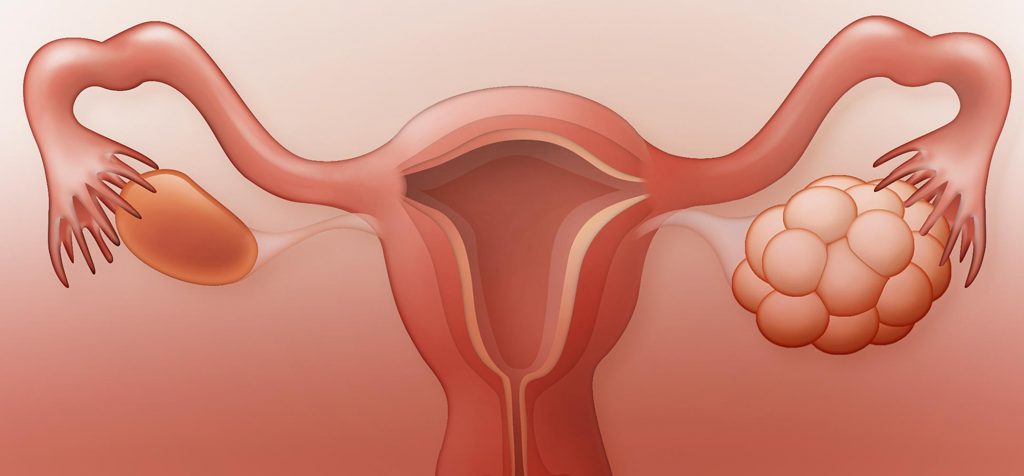PCOS TREATMENT IN AYURVEDA
HOW DO YOU COPE WITH PCOS?
PCOS (polycystic ovary syndrome) is a female endocrine hormonal disorder affecting 10 percent of women in India, and the count is increasing slowly. It leads to infertility in women, and in ayurvedic terms it is related to Aarthava Kshaya. According to some research, insulin resistance can be a key trigger to this syndrome. There are numerous treatments for PCOS, but the efficacy of PCOS treatment in Ayurveda has been proved in multiple studies. PCOS Ayurvedic Treatment in Kerala focuses on seeking the root cause of the disease and devises personalized treatment, which involves internal herbal medicines and external therapies. It focuses on adopting the holistic approach to managing conditions and symptoms by changing routine diets, massages, herbal remedies, and treatments to improve stamina from the inside. In Ayurveda, PCOS depicts the imbalance of Kapha and Vata.

What is PCOS, and what are its symptoms?
PCOS is a condition where ovaries develop high amounts of androgens (male hormones), specifically testosterone, that lead to high levels of luteinizing hormone (LH) and low levels of follicle-stimulating hormone (FSH). It prevents follicles from producing a mature egg, and it leads to anovulatory cycles and irregular menstruation. In this condition, ovaries tend to enlarge and secrete huge amounts of estrogenic and androgenic hormones, resulting in a lack of ovulation and infertility.
PCOS Symptoms
 The PCOS problem symptoms vary but here are some common symptoms.
The PCOS problem symptoms vary but here are some common symptoms.
- Irregularity in periods- PCOS leads to a lack of ovulation, preventing the uterine lining from shedding monthly.
- Hair growth – The abnormal growth of hair on the face and body.
- Acne – PCOS leads to more oil secretion and makes the skin oilier. It also leads to breakouts in areas like the face, chest and back area.
- Weight gain – Gain more weight leading to obesity or being overweight.
- Hair baldness – Hair fall may cause baldness on the scalp.
- Headaches – PCOS triggers headaches in some women.
Ayurveda treatment for PCOS
The treatment of PCOS depends on the symptoms like srotoshodhan, Kapha- Vata har, or pitta. After analyzing the same, the vata har treatment is carried out. If there is excessive Kapha aggravation, then vaman is followed. Vasti treatment is beneficial to balance Apana and focuses on balancing the hormones.
Lekhan vasti and Udvartanam are beneficial in balancing Kapha and decreasing weight. Uttar vasti is utilized for PCOS induced infertility and induction of ovulation. There are numerous ayurvedic formulations/ medicines that can be used for PCOS.
In Ayurveda, the PCOS involves Kapha and VataDosha, Meda, Mamsa, Rakta Dhatu, and Panchakarma hold the capacity to offer the best results with its unique therapies.
Panchakarma is one of the initial therapy lines for PCOS as it manages the root cause by removing toxins from the reproductive system.
Panchakarma for PCOS
The ‘Panchakarma’ therapy is one of the effective techniques to trigger power to different parts of the body including the uterus, Fallopian tubes and ovaries. The equilibrium of hormones is preserved by panchakarma treatment.
1. Basti (Vasti):
The enema of herbal oil or decoction is offered through the rectum. Vitiated “Vata” can lead to various health issues, and Basti removes impediments to Vata Dosha and therefore regulates the natural “Vata” phenomena. Different types of herbal oils, Ghruta, milk, or decoctions are utilized in Basti therapy.
The Basti treatment helps in bringing the “Vata” Dosha into equilibrium. Shukra Dhatu (Semen) in males and Aartava (Ovum) in females are controlled by Apana Vayu, a kind of “Vata Dosha.” The reproductive system is regulated by ‘Apan Vayu.’
In females, the Basti of “Sahachar Tail (oil),” improves ovulation consistency on regular days. The Basti therapy enhances total sperm count and motility in males by increasing the thickness and amount of semen.
2. Uttarbasti (Vasti):
The most effective treatment for gynecological problems appears to be Uttarbasti (Vasti). It dissolves the cyst in the ovaries more effectively than oral medicines due to its actions on the uterus and ovaries. It also aids in the purification and flushing of the Aartava Vaha Srotas, calming the vitiated Apana Vayu, and increasing follicular maturity.
3. Virechan
It removes toxins from the body as ‘Pitta’ vitiated. The cleaning takes place in the small intestine and other Pitta organs. In this situation, medicines that let the intestine flow more easily are beneficial for dosha removal via the rectum. It works on the same hormonal balance as ‘Vaman Karma.’
4. Vamana
Cleaning procedure aimed largely at removing the vitiated ‘Kapha.’ This is a non-painful, drug-induced emetic procedure mostly performed in Vasant Rhitu.
5. Fertility Massage
The normal functioning of the uterus can be aided by a mild and vigorous massage of the lower abdomen in a specific pattern. Fertility massage also lowers lower abdominal pressure and improves pelvic blood flow.
Ayurveda provides the most effective medicines and treatments for PCOS, focusing on reproductive care that aids in natural conception.
Hormone management using herbal medicines is highly successful. The treatment of Panchakarma is effective in detoxifying the body and preparing it for future treatments or drugs. It has been discovered that follicles break spontaneously without hormonal injections after completing the panchakarma treatment, such as Uttar Basti(vasti).
Yoga for PCOS
Yoga poses which are also called asanas are best for treating PCOS. Some of the postures are:
- Supta Baddha Konasana (Reclining Butterfly Pose)
- Bharadvajasana (Bharadvaja’s Twist)
- Chakki Chalanasana (Mill Churning Pose)
- Shavasana (Corpse Pose)
